The Woman Who Bested the Men at Math
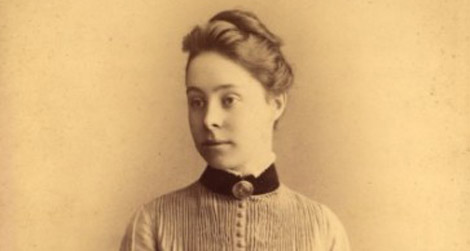
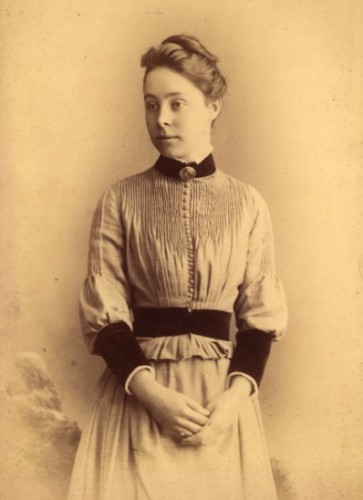
Philippa Fawcett. When she placed first in the Cambridge mathematical tripos in 1890, she forced a reassessment of nineteenth-century belief in the inferiority of the "weaker sex."
To be a woman in the Victorian age was to be weak: the connection was that definite. To be female was also to be fragile, dependent, prone to nerves and—not least—possessed of a mind that was several degrees inferior to a man’s. For much of the 19th century, women were not expected to shine either academically or athletically, and those who attempted to do so were cautioned that they were taking an appalling risk. Mainstream medicine was clear on this point: to dream of studying at the university level was to chance madness or sterility, if not both.
It took generations to transform this received opinion; that, a long series of scientific studies, and the determination and
hard work of many thousands of women. For all that, though, it is still possible to point to one single achievement, and one single day, and say: this is when everything began to change. That day was June 7, 1890, when—for the first and only time—a woman ranked first in the mathematical examinations held at the University of Cambridge. It was the day that Philippa Fawcett placed “above the Senior Wrangler.”
To understand why one woman’s achievement so shook the prejudices of the Victorian age—and why newspapers from the
New York Times to the
Times of India thought it worthwhile to devote thousands of words to an exam that today means little to anybody but the students themselves—it is necessary to understand why Cambridge mathematics mattered in the 19th century. To begin with, the university was arguably the finest seat of learning in what was then the greatest empire in the world. More than that, though, the Cambridge math course was generally regarded as the toughest academic challenge available to that empire’s finest minds. To be Cambridge’s champion mathematician—its “Senior Wrangler,” in the university’s ancient slang—was to attain the greatest intellectual distinction available to a quarter of the population of the globe. It practically guaranteed a stellar academic career; no fewer than nine Senior Wranglers became Lucasian Professor of Mathematics at Cambridge, a position held by both Sir Isaac Newton and Stephen Hawking.

The Senate House at the University of Cambridge, where examination results were historically read aloud each June. Today results are posted on the noticeboards shown; their peculiar green tinge is known as "Cambridge blue." Photo: Peter Church for Geograph, used under CCL.
Thus Fawcett’s triumph was astonishing—all the more so when it is realized that Cambridge, like most of the other great universities of the day, including Oxford, Harvard and Yale, did not admit women or permit them to take degrees. Separate colleges had been established for women only in the 1870s, and they gradually became loosely affiliated with universities. By the 1890s things had advanced to the point where the women at those colleges—Cambridge had two, Newnham and Girton—were allowed to take the same exams as males. But they were marked and ranked separately, with the women’s results read after the men’s at an annual ceremony held at the university Senate House. Math students, uniquely, were ranked in numerical order, from first to last, rather than in broad bands of ability, so it was possible to compare one student directly with another. Men taking “first class” degrees in math—equivalent to the American
summa cum laude–became Wranglers; those placed below them in the second class–
magna cum laude–were Optimes. If a woman scored a mark, say, higher than the 21st Optime but lower than the 20th, she would be announced as “between the 20th and 21st Optimes.”

"Honour to Agnata Frances Ramsay." From Punch, July 2, 1887. The figure on the right is "Mr. Punch," and the dog is Toby—both originally features of that great British institution, the "Punch and Judy Show."
The idea that a female candidate could score highly enough to be ranked among the Wranglers was still fairly startling in 1890. To considerable surprise, the earliest tests, dating to the 1860s, had suggested that men and women scored roughly equally in every other subject. But math remained inviolate; male mathematicians still did incontestably better. So when a Girton student named Agnata Ramsay topped the rankings in the Classics exams in 1887—she was the only candidate, male or female, awarded a first-class degree in the subject that year—the 21-year-old’s reward amounted to nothing more than an admiring cartoon in
Punch (a humorous British weekly scarcely known for its support for women’s rights) and a proposal of marriage from H.M. Butler, the brilliant but 55-year-old Master of Trinity, Cambridge’s largest and wealthiest college (which Ramsay accepted).
Ramsay’s triumph, remarkable though it was, only reinforced the status of math as the last bastion of male academic supremacy. There, at least, female bodies and female brains still fell short of men’s. Indeed, most Victorian scholars believed a woman was simply incapable of demonstrating the unwavering logic required to master math, since women were at base creatures of emotion.

Newnham College, Cambridge, Philippa Fawcett's alma mater. Founded in 1871, it became a full part of the University of Cambridge only in 1948. Photo: Wikicommons.
Today, the science that underpinned those views seems crackpot. To the Victorians, it was breakthrough stuff. Central to the 19th-century concept of human development was the idea that the adolescent body was a closed system; there was only so much energy available, and so a body in which resources were diverted to mental development was one in which physical development necessarily suffered. This was thought to be a particular problem for women, because their reproductive system was far more complicated than men’s and so consumed a greater proportion of the body’s resources. A young woman who studied hard during puberty was believed to be taking special risks since “the brain and ovary could not develop at the same time,” as historian Judith Walzer Leavitt points out. Equally popular was the belief, based on crude measurements of skull volume, that women were doomed to remain childlike in important ways—”weak-willed, impulsive [and] markedly imitative rather than original, timid and dependent,” as Cynthia Eagle Russett puts it—because their brains were smaller than mens’.
Philippa Fawcett seems almost to have been born to achieve. She was the only child of two remarkable parents; her mother,
Millicent, as chair of the National Union of Women’s Suffrage Societies, did more even than the famous
Emmeline Pankhurst to secure for British women the right to vote, while her father, Henry Fawcett, though blinded in a shooting accident when 25, rose to be a minister in the British government. One of the few memories that survives of Philippa’s childhood has her skating along the river from Cambridge to Ely, a distance of more than 15 miles, guiding her father all the way by whistling to him.
Philippa showed early academic promise—there is some reason to suppose that her parents had her coached in math specifically in the hope that she could help them demonstrate the equality of women—and before earning a place at Newnham College she took courses in pure math and applied math at University College London (a much newer university, where even in the 1890s women and men could study side by side). Even this, though, was no real preparation for the rigors or the eccentricity of the Cambridge math “tripos”—the year-ending exams, so named after the three-legged stools on which students had sat in the 15th century.
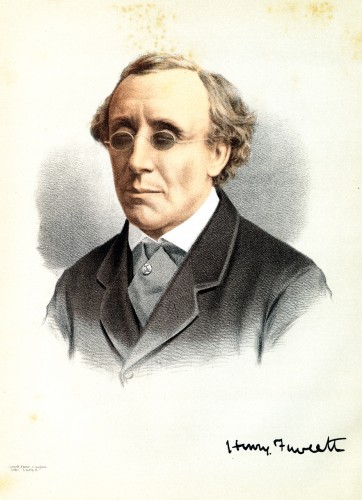
Though blinded at age 25, Philippa's father, Henry Fawcett, served as postmaster-general in the Liberal government of William Gladstone, climbed in the Alps, and skated up to 60 miles a day.
Candidates typically sat for five and a half hours of exams every day for eight days—12 papers and 192 progressively more difficult questions in all. Those in contention for the title of Wrangler then sat for a further three days of examinations consisting of 63 still more testing problems. The most serious candidates invariably hired tutors and worked more or less round the clock for months. The historian Alex Craik notes that C.T. Simpson, who ranked as Second Wrangler in 1841, topped off his efforts by studying for 20 hours a day in the week before the exams and “almost broke down from over-exertion… [he] found himself actually obliged to carry a supply of ether and other stimulants into the examinations in case of accidents.” James Wilson, who topped the rankings in 1859, had a nervous breakdown immediately after his exams; on his recovery he discovered he had forgotten all the math he ever knew except elementary algebra. And James Savage worked himself so hard that he was found dead of apoplexy in a ditch three months after being named Senior Wrangler of 1855.
Philippa Fawcett was coached—her tutor, E.W. Hobson of Christ’s College, was regarded as the second-best man teaching at Cambridge in her time—but she adopted an altogether more reasonable approach to her studies. Stephen Siklos, a present-day Cambridge mathematician, notes that Fawcett led “a disciplined and orderly life,” rising at 8 a.m. and rarely going to bed later than 11 p.m. She studied six hours a day, but refused to yield to the then-popular practice among aspirant Wranglers of working through the night with a wet towel wrapped around her head.
One reason Fawcett did so is that she knew that she was being watched; she went out of her way to deny ammunition to those who tried (in the words of a contemporary newspaperman) “to make out that the women’s colleges are peopled by eccentrics.” Her determination not to stand out was only reinforced by a scandalous report in London’s
Pall Mall Gazette that she dared to wear “her thick brown hair down to her shoulders, and has even been known (so I have heard) to ride on top of a bus.”
The challenge facing Fawcett and her fellow students was certainly daunting: the mathematics tripos questions were so complex that even the best candidates could scarcely hope to fully solve two, and make a stab at two more, of the 16 devised for each paper. Each paper ranged incredibly widely, and the questions were frequently arcane; the German mathematician Max Born satirized a typical example as: “On an elastic bridge stands an elephant of negligible mass; on his trunk stands a mosquito of mass
m. Calculate the vibrations on the bridge when the elephant moves the mosquito by rotating his trunk.” And Siklos summarizes the challenge this way:
By 1890, the Mathematical Tripos had developed into a severe test not so much of mathematical ingenuity as of stamina and solid ability… The topics ranged from compound interest to number theory, hydrodynamics and astronomy. Candidates were expected to be familiar with the work of Newton and Euclid, to be able to predict eclipses, to manipulate obscure trigonometrical identities and to be on intimate terms with all possible two and three dimensional conics.
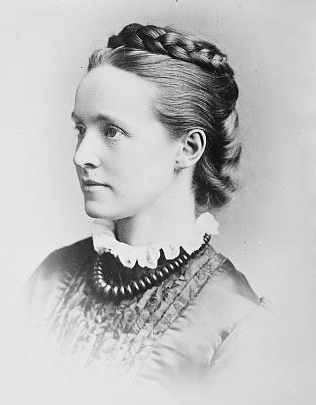
Millicent Fawcett, Philippa's mother, was not only a leading suffragist, but also cousin to Elizabeth Garrett Anderson, the first woman to qualify as a doctor in the U.K.; to do so, Anderson had to study in Scotland, as no English medical school would accept her as a student.
Fawcett’s ingrained fortitude appears to have stood her in excellent stead during the examination period. She declined the chance to get away from her college for the last few days before the papers began, on the ground that it might disturb her routine. When asked if she wished the ordeal were over, she answered that in no circumstances would she want to wish away three weeks of her life. Although depressed by her first encounter with a tripos paper, on which she could answer only three problems and “try at 6 or 7″ more, she recovered her spirits when she discovered than none of the other candidates she knew had completed a single answer. By the end of May 1890, expectations were high at Newnham that Fawcett had done better than any other candidate the college had ever entered in the math exams. It remained far from certain, though, how Newnham’s women would rank against the men.
G.F. Browne, the secretary of the Cambridge exam board, was also concerned—because he feared that the women entered in the 1890 exams might be so far below par that they would disgrace themselves. He feared that one might even place last, a position known at Cambridge as “the Wooden Spoon.” Late on the evening of June 6, the day before the results were to be announced, Browne received a visit from the senior examiner, W. Rouse Ball, who confided that he had come to discuss “an unforeseen situation” concerning the women’s rankings. Notes Siklos, citing Browne’s own account:
After a moment’s thought, I said: ‘Do you mean one of them is the Wooden Spoon?’
‘No, it’s the other end!’
‘Then you will have to say, when you read out the women’s list, “Above the Senior Wrangler”; and you won’t get beyond the word ‘above.’ “
By morning, word that something extraordinary was about to occur had electrified Cambridge. Newnham students made their way to the Senate House en masse, and Fawcett’s elderly grandfather drove a horse-drawn buggy 60 miles from the Suffolk coast with her cousins Marion and Christina. Marion reported what happened next in a letter:
It was a most exciting scene in the Senate… Christina and I got seats in the gallery and grandpapa remained below. The gallery was crowded with girls and a few men, and the floor of the building was thronged with undergraduates as tightly packed as they could be. The lists were read out from the gallery and we heard splendidly. All the men’s names were read first, the Senior Wrangler [G.T. Bennett of St John's College] was much cheered.
At last the man who had been reading shouted “Women.”… A fearfully agitating moment for Philippa it must have been…. He signalled with his hand for the men to keep quiet, but had to wait some time. At last he read Philippa’s name, and announced that she was “above the Senior Wrangler.”
The male undergraduates responded to the announcement with loud cheers. Back at the college, “all the bells and gongs which could be found were rung,” there was an impromptu feast, bonfires were lit on the field hockey pitch, and Philippa was carried shoulder-high into the main hall—”with characteristic calmness,” Siklos notes, “marking herself ‘in’ on the board” as she swayed past. The men’s reaction was generous, particularly considering that when Cambridge voted against allowing women to become members of the university in 1921, the undergraduates of the day celebrated by battering down Newnham’s college gates.
The triumph was international news for days afterwards, the
New York Times running a full column, headlined “Miss Fawcett’s honor: the kind of girl this lady Senior Wrangler is.” It soon emerged that Fawcett had scored 13 percent more points than had Bennett, the leading male, and a friendly examiner confided that “she was ahead on all the papers but two … her place had no element of accident in it.”
Philippa Fawcett was not only the first woman to place above the Senior Wrangler; she was also the last. Cambridge
dropped the ancient distinction in 1909 because, as mathematics became more specialized, it had become increasingly difficult to rank candidates with skills in different branches of the subject in purely numerical order.
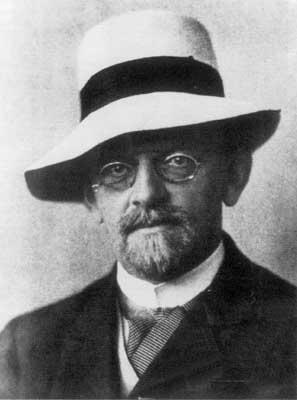
David Hilbert: "Gentlemen, we are not running a bathing establishment." Photo: Wikicommons.
It took much longer for academics to abandon their prejudice against allowing women to take their degrees alongside men. Although the University of London had led the way in granting women equal status in 1882, it was not until 1919 that the great German university at Göttingen followed suit (and then only after a debate during which, asked “Whatever would our young men returning from the war think of being taught by a woman?” the chair of the math department, David Hilbert, famously responded: “Gentlemen, we are running a university, not a bathing establishment”). In Britain, Oxford yielded in 1920; in the United States, Yale did not desegregate until 1969, and Harvard not until 1977.
As for Cambridge, women were finally allowed to take degrees alongside men in 1948. Happily, Philippa Fawcett lived to see this confirmation of all she had stood for in the 1890s. Having spent her career as an educator–lecturing at Newnham for some years, but of course being denied the academic career a male Wrangler would have thought his right–she died, aged 80, one month after her alma mater approved the principal of equal education for women and 58 years after she had been placed “above the Senior Wrangler.”
Sources
Anon. “Miss Fawcett’s Honor; The sort of girl this lady Senior Wrangler is.”
New York Times, June 24, 1890; Alex Craik.
Mr Hopkins’s Men: Cambridge Reform and British Mathematics in the Nineteenth Century. London: Springer Verlag, 2008; D.O. Forfar. “What became of the Senior Wranglers?” In
Mathematical Spectrum 29 (1996); Judy Green; “
How Many Women Mathematicians Can You Name?” Colloquium address at Miami University [OH], June 29, 2000; Judith Walzer Leavitt.
Woman and Health in America: Historical Readings. Madison [WI]: University of Wisconsin Press, 1999; Jeremy Gray. “Mathematics in Cambridge and beyond.” In Richard Mason (ed.),
Cambridge Minds. Cambridge: CUP, 1994; Susan Sleeth Mosedale. “Science corrupted: Victorian biologists consider the women question.” In
Journal of the History of Biology 11 (1979);
Newnham College Roll Letter, February 1949, 46-54. Newnham College Archives, Cambridge; Katharina Rowold.
The Educated Woman: Minds, Bodies and Women’s Higher Education in Britain, Germany and Spain, 1865-1914. New York: Routledge, 2010; Cynthia Eagle Russett.
Sexual Science: the Victorian Construction of Womanhood. Cambridge [MA]: Harvard University Press, 1991; Stephen Siklos.
Philippa Fawcett and the Mathematical Tripos. Cambridge: Newnham College, 1990; W.W. Rouse.
A History of Mathematics at Cambridge. Cambridge: Cambridge University Press, 1903; Jonathan Smith & Christopher Stray (eds).
Teaching and Learning in Nineteenth Century Cambridge. Woodbridge, Suffolk: Boydell Press, 2001; Patricia Vertinsky.
The Eternally Wounded Woman: Women, Doctors and Exercise in the Late Nineteenth Century. Manchester: MUP, 1989.
A collection of books and papers on women and mathematics in the nineteenth century,
named in Philippa Fawcett’s honor, is held by the London Mathematical Society.






























